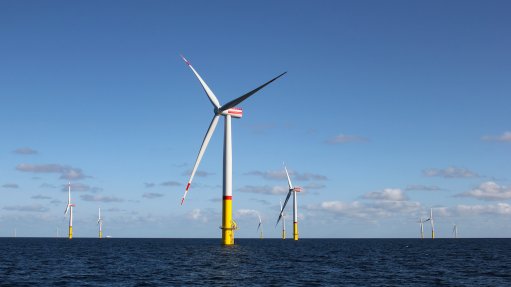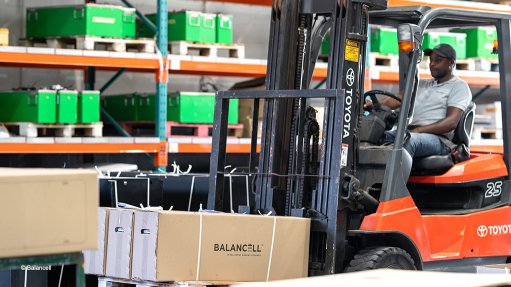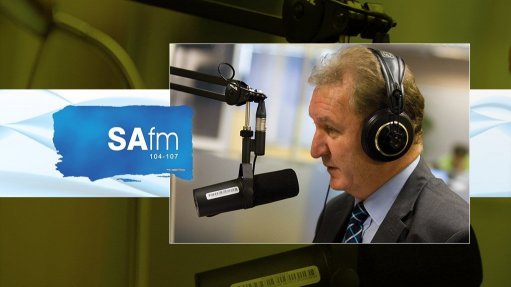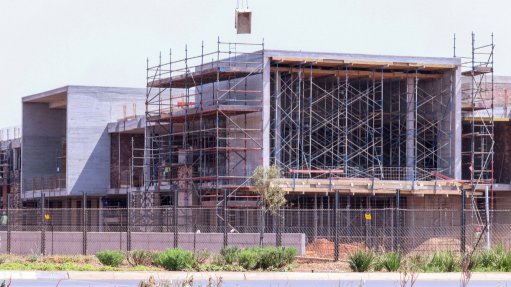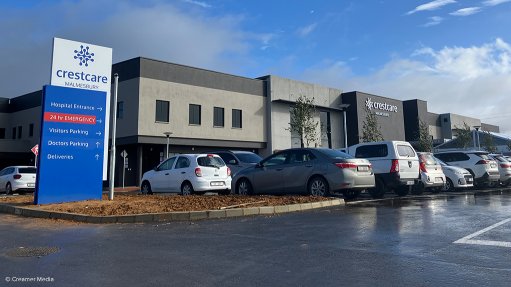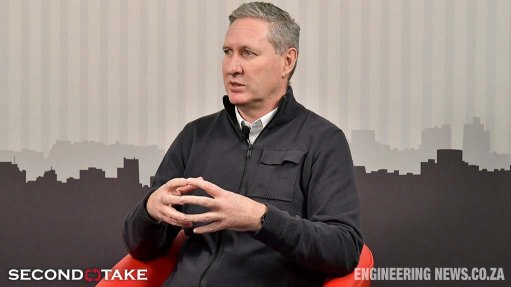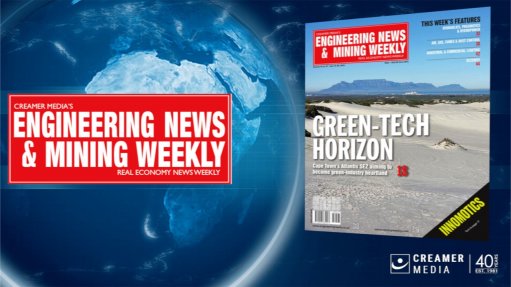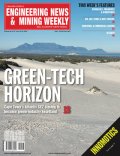Future intermediate fuel being researched in South Africa
Sasol, together with the University of Cape Town (UCT), is researching the fuel, which will be a variation of petrol and diesel.
“It may not be gas-to-liquids (GTL) as such but a variation of GTL,” Sasol technology GM Johan Botha tells Engineering News in an exclusive interview at the company’s office in Randburg. Sasol has seconded senior staff to the UCT laboratory, where post-graduate students from the university will assist in the research and development of this fuel. It has positive spin-offs for the students, who are able to work with experts in the field and may have the opportunity to work with original-equipment manufacturers (OEM) abroad, assisting in the design of this intermediate fuel. One of the challenges it faces is the new lead phase-out legislation, to be implemented in January 2006, in which the South African government has committed South Africa, petrol to be 100% unleaded, with a lower sulphur content than currently available.
The company is collaborating with the government in developing an unleaded petrol with a new octane structure.
Already developed is an unleaded petrol which provides sufficient lubrication for the engine exhaust valves of older engines, that traditionally require leaded petrol, by the use of additive chemistries, providing an innovative solution to ensure the effective functioning of all vehicles. “The new legislation will result in many changes in the vehicle and fuel industries, especially with respect to pre-1990 vehicles, of which a larger proportion would require a valve seat recession prevention additive in 2006,” Sasol manager technical services wholesale and retail John Fitton tells Engineering News.
All vehicles produced locally and internationally from 1990 are designed for unleaded petrol use, and thus will be fitted with a hardened exhaust, negating the need for lubrication.
Sasol is excited about the prospects that its synthetically-produced low-sulphur diesel offers.
One of the international challenges associated with low sulphur diesel it that the removal of sulphur has a negative effect on the lubricating quality of the resultant diesel.
Sasol is an industry leader in this area and has developed effective methods, ensuring that its low- sulphur diesel exhibits superior lubrication characteristics.
Vehicle emissions are only one of the national fuel-related challenges South Africa faces. However, the government is looking at developing a framework for solving the issue, which will have a further impact on fuel specifications. The company is looking to promote the immediate implement-ation of emission standards in South Africa, which is equivalent to a Euro 1/2 level for all vehicles.
This could be implemented by government as soon as 2004, as the enabling fuels will be available in the market from all fuel marketers.
It will have an immediate effect on reduction of vehicle emissions by over 90%.
A critical aspect to tackle from a vehicle emissions point of view is a proper and enforced vehicle maintenance programme, as poor maintenance will undo any benefits that may be derived from vehicle emission abatement technologies, enabled by high-quality fuels.
These can be policed by relatively simple roadside vehicle checks. Botha explains that a total emission package is necessary, consisting of emission source inventory, including industry and domestic fuel usage; vehicle technologies, such as catalytic converters; a maintenance and policing programme, which enables fuels, traffic management and policing that are essential elements contributing to improved air quality in South Africa.
“Certain local authorities are attempting to implement local by-laws for emission standards, with Cape Town being the most advanced in this regard, implementing its own local regulations and enforcement strategies,” Sasol technical services supply and trading manager Douw van der Merwe tells Engineering News.
The challenge traffic officials are currently facing is that they are checking the emissions in the form of visible smoke on vehicles, but do not have the backing of the law, since the last legislation was drafted in 1969.
“Air quality improvements have to come from an envisaged future ambient air quality standard and then work down, through desired vehicle technologies, maintenance programmes, enabling fuels and policing, involving all stakeholders and various sources along the way, because focusing on one area is not going to have the desired effect,” Botha explains.
The company describes Sasol’s new TurboDiesel as a great success story, for which it is currently conducting performance fleet testing with various OEMs in the country, with great success.
Heavy-duty diesel vehicles in South Africa, which generally carry loads in excess of European norms and consume double the fuel per kilometre than their European counterparts, are working much harder under more severe conditions and could benefit significantly from superior fuels like Sasol TurboDiesel and the advanced Sasol lubricant range.
The objective of the OEM test programmes was to scientifically determine whether it was able to stretch its oil-drain intervals, meeting the European performance norms.
South African operating conditions are more severe, but the outcome has proved to be very successful.
“The diesel engine wear rates are decreasing dramatically with Sasol TurboDiesel and we are extending the life of the engine and the lubricant, which will decrease the operating cost of the vehicles and the total cost of ownership to the fleet and vehicle operator or owner,” Botha says.
Sulphur in diesel converts to sulphurous acids in the combustion chamber, which is pushed down into the oil in the sump, where it rapidly degrades the engine oil life, contributing to soot formation and oil thickening, This results in less effective lubrication. These acids also significantly increase corrosive engine wear. Sasol has been able to extend the life of engine oils significantly in a market-related fleet test, by eliminating the negative effects of diesel sulphur content, using Sasol TurboDiesel.
The environment also benefits due to the large decrease in airborne pollutants by the low-sulphur diesel. The overall result is diesel vehicle fleet-owners gaining significant long-term benefits, such as decreased maintenance and a higher rate of capital availability, which is an overall lower cost of ownership, outweighing the marginal premium being paid for the cleaner, high-performance diesel. “One of the main advantages of working directly with reputable OEMs is that they are willing to consider the extension of their normal South African vehicle guarantees if it can be proved that the customer only uses Sasol TurboDiesel,” Botha says.
Sasol is also optimistic that its fully-synthetic jet fuel could be approved by the end of this year, since its successful semisynthetic jet fuel was accepted by inter- national aviation authorities, namely the Ministry of Defence in the UK, ASTM, IATA, international airframe manufacturers, such as Boeing and Airbus, and engine manufacturers, such as Rolls-Royce and General Electric, into the jet fuel specifications governing its global manufacturing and use.
This approval in 1999 was the result of three years of intensive development and testing. As a result, every jet-engined aircraft flying out of Johannesburg International Airport today is flying on coal- derived Sasol jet fuel.
The company has, as a pilot project, started experimental tests with the US military in developing a single fuel to be used in all battlefield applications, both aircraft and ground-based equipment.
Comments
Announcements
What's On
Subscribe to improve your user experience...
Option 1 (equivalent of R125 a month):
Receive a weekly copy of Creamer Media's Engineering News & Mining Weekly magazine
(print copy for those in South Africa and e-magazine for those outside of South Africa)
Receive daily email newsletters
Access to full search results
Access archive of magazine back copies
Access to Projects in Progress
Access to ONE Research Report of your choice in PDF format
Option 2 (equivalent of R375 a month):
All benefits from Option 1
PLUS
Access to Creamer Media's Research Channel Africa for ALL Research Reports, in PDF format, on various industrial and mining sectors
including Electricity; Water; Energy Transition; Hydrogen; Roads, Rail and Ports; Coal; Gold; Platinum; Battery Metals; etc.
Already a subscriber?
Forgotten your password?
Receive weekly copy of Creamer Media's Engineering News & Mining Weekly magazine (print copy for those in South Africa and e-magazine for those outside of South Africa)
➕
Recieve daily email newsletters
➕
Access to full search results
➕
Access archive of magazine back copies
➕
Access to Projects in Progress
➕
Access to ONE Research Report of your choice in PDF format
RESEARCH CHANNEL AFRICA
R4500 (equivalent of R375 a month)
SUBSCRIBEAll benefits from Option 1
➕
Access to Creamer Media's Research Channel Africa for ALL Research Reports on various industrial and mining sectors, in PDF format, including on:
Electricity
➕
Water
➕
Energy Transition
➕
Hydrogen
➕
Roads, Rail and Ports
➕
Coal
➕
Gold
➕
Platinum
➕
Battery Metals
➕
etc.
Receive all benefits from Option 1 or Option 2 delivered to numerous people at your company
➕
Multiple User names and Passwords for simultaneous log-ins
➕
Intranet integration access to all in your organisation







